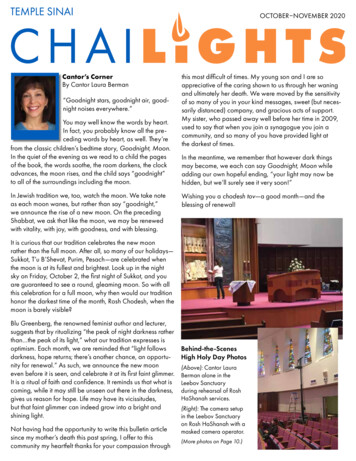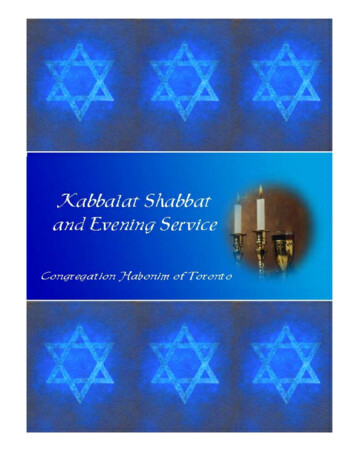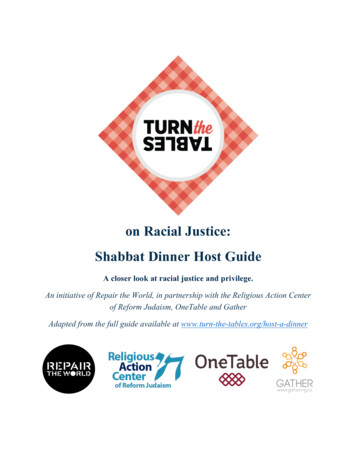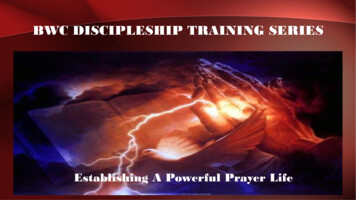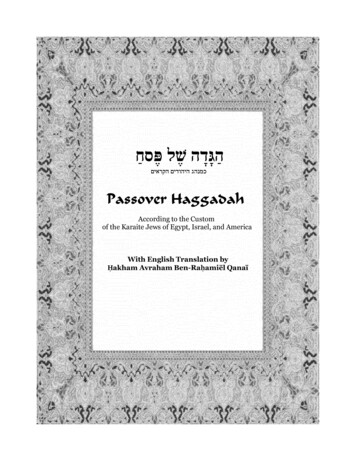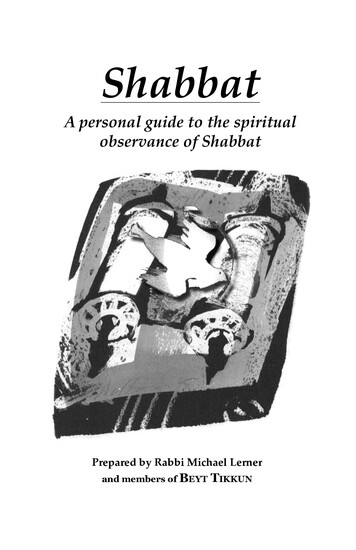
Transcription
ShabbatA personal guide to the spiritualobservance of ShabbatPrepared by Rabbi Michael Lernerand members of BEYTTIKKUN
An Invitation toCelebrate ShabbatThis is a guide to celebrating Shabbat in your own home. It isintended to complement your celebration of Shabbat with theBeyt Tikkun community. The Guide may be used along with ourShabbat prayer book from the Reconstructionist Press, Kol Haneshama:Shabbat Vehagim, and with the United Jewish Appeal’s “Book of Songsand Blessings.”Some of the translations in this Shabbat guide are based on or inspiredby the insights of Rabbi David Wolfe Blank (z”l) and are reprinted here,sometimes in slightly altered versions, with permission he gave us shortlybefore his untimely death in 5758.
Copyright 2004 BEYT TIKKUNIllustrations by Julie Denton: 612 227-3848For additional copies, contact Beyt Tikkun:Beyt Tikkun Community Synagogue370 Vassar St. Berkeley, California 94102Phone: 415.575.1432E-mail: shul@tikkun.orgWeb site: www.beyttikkun.org
ContentsWhat Is Shabbat, the Sabbath, Really About?.5Politics of Meaning and Shabbat .6The Need for Ecological Awareness .6The Need for Spiritual Awareness .7Shades of the Messiah .8Shabbat as a Spiritual Practice .8The Basic Principles of this Spiritual Practice .10Shabbat as a Message of Liberation .13Preparing for Shabbat .13Friday Night . 15Candle Lighting .15Blessing Children and Each Other.16Kabbalat Shabbat.16Prayer Celebrating Creation .16The Prayer of God’s Love: Ahavat Olam. 17Shalom Aleychem—Welcoming the Angels. 19Blessings Before the Meal .20Kiddush . 20Handwashing . 21Challah . 22Traditional Greeting: . 23The Sabbath Meal .23A Word About Food . 23Study . 23Conversation . 24Singing . 24Blessing After The Meal—Birkat HaMazon .24After Dinner .25
Shabbat Morning . 25Upon Waking .25Morning Meditation .26Birchot Ha Shachar— Morning Blessings .26Blessing the ability to perceive light. 27Blessing the miracle of vision . 27Blessing the Power of Liberation . 27Blessing the Ability to Overcome Surplus Powerlessness . 27Meditation on the Nature of God .28Morning Prayers—Shachreet .29Torah Study . 29Shabbat Morning Walk .32Saturday Afternoon . 32Shabbat Kiddush and Lunch .32Afternoon Kiddush .33Shabbat Afternoon .34Havdalah: The Ending of Shabbat . 36Melaveh haMalkah .39Zmirot: Songs for Shabbat . 39Shabbat Readings . 40Prayer Books and Song Books .40Other Readings .40Guide to Pronunciation . 43
What Is Shabbat, the Sabbath,Really About?Shabbat is the celebration of two monumental aspects of human life: The creation of the universe. Our liberation as a people from Egypt—and the resultingmessage that the world can be liberated from all forms ofoppression.Yet the celebration is more than just a moment of thankfulness. It is,rather, a personal reliving of the creation and of the liberation.For 25 hours (from 18 minutes before sunset on Friday night until it’s darkenough to see at least three stars on Saturday night) we re-orient ourselvesand change the way we live our lives.Here is how we change: Instead of trying to control the world or exerciseour dominance over nature, we celebrate the universe. We rejoice in the physical world. We approach the world with awe, wonder, and radicalamazement at the grandeur of creation—and thank God forCreation. We rejoice in our freedom. And we exercise that freedomby refraining from all forms of work and domination overnature. We rejoice in each other. We rejoice in all that is. We rejoice in our bodies. We enjoy sexuality. We play. We eat good food. We connect with our own deepest inner places. We learn about ourselves. We engage in non-work related study of Judaism, spirituality, or anything else that uplifts our spirits and is fun tolearn. We allow ourselves to be alone. 6
We allow ourselves to be with others. We allow ourselves to be with God.Shabbat is a gift of love from God to the world (and from you to anyoneyou share this spiritual practice with).What makes Shabbat a gift of love?Love is the permission we give to each other and to ourselves to leave theworld of power and control and to enter into a consciousness of non-goaldirected playfulness, humor, silliness, sensual pleasure, mutual recognitionand caring, celebration, joy, wonder, amazement, and awe.Shabbat is a particular spiritual practice whose goal is to maximize thiskind of loving energy in your life.Politics of Meaning and ShabbatShabbat is a time to refresh our souls, to pause and reconnect ourselvesto the goal of such a struggle. The rabbis of our tradition called Shabbat“shades of the Messiah” to indicate that on Shabbat we could create a moment in which we experienced some of what it might be like in the worldthat we hope to create some day.The Need for Ecological AwarenessAll week long we are part of the frenetic rush of time as our society seeksto dominate and control nature. Our fundamental orientation to the worldis based on how to make the world respondto our needs and demands.There is nothing wrong with humanbeings seeking to exercise some degreeof control. We are glad that the humancommunity has developed science andtechnology and we rejoice in the many benefits that these enterprises have broughtto us. But we are also aware that in theprocess there has been a skewing of theway we look upon the world that can bevery destructive.When the physical world is seen as littlemore than a “resource” for solving humanneeds, we get a very distorted relationshipto the natural world. We begin to think thatthe earth has an inexhaustible supply of resources for us to use up in any way that we 7
please, and that we can dump our waste matter without limit. Moreover, oureconomic system allows a few thousand major multinational corporationsto make the major decisions about how to use the world’s land, air, rivers,streams, minerals, trees, and oceans—and for the most part this use hasbeen motivated by the desire to maximize corporate profits. The result hasbeen a monumental ecological crisis that may very well destroy the planetor at least all human life on it.We need to learn how to balance our legitimate need to control someaspects of the planet with another orientation of awe and respect for theenvironment.The Need for Spiritual AwarenessThe competitive marketplace encourages us to think of everything solelyfrom the perspective of “what can I get from it?” Everyday in the world ofwork, people learn that their work is being judged in accord with a “bottomline” that assesses them in terms of how much money and power they canaccumulate for the corporation or, if as private entrepreneurs or independent professionals or small business people, for themselves. We are encouraged to look at others primarily in terms of how they can serve us—in ourassent to greater power in the corporate or non-profit or governmental oreducational institution in which we work, or in helping us obtain sales orclients or patients.And there is never enough. No matter how much money or power weaccumulate, we never feel secure. We know that there are others who mighttake advantage of us, push themselves forward if we are not constantly onthe alert, using every moment to push our own careers forward.The result is a frenetic life. Increasing numbers of people report that,despite the advent of timesaving devices like computers and faxes and modems, they feel that they have less and less time for themselves.Moreover, what time they do have has been polluted by the dominantway of thinking in the society. “Looking out for number one” and seeingother people as means to your own ends and looking at the earth as nothingmore than a resource for human needs is egocentric and destructive. Theseattitudes, of course, are never confined to the economic marketplace. Whenpeople have been working all day in an environment that teaches us to lookat everything from the standpoint of “what’s in it for me?” they inevitablybring this same way of thinking home. The result is a monumental spiritualand ethical crisis—a crisis of materialism and selfishness.These issues require social and political action. They require a powerfulecological movement, a movement that fights for social justice and for a“new bottom line” in our society, so that rationality and productivity getsdefined not solely in terms that measure money and power, but also in 8
terms that take into account how much love, caring, solidarity, and spiritual,ethical, and ecological sensitivity has been generated. To recognize thathuman beings have a need to be part of a world governed by somethingmore than money and power, that we have a need for higher ethical andspiritual meaning, and to rebuild our social institutions so that they supportus rather than undermine our spiritual and ethical needs—this is what wemean by a politics of meaning.Shades of the MessiahThe struggle to change the world in this way is central to what Judaismis about. Shabbat is “zeycher l’tziyat Mitrzrayim,” a day to remember theExodus from Egypt, and its message to the world: Class structure is not builtinto the fabric of reality as some unchangeable element, oppressive socialand economic systems can be replaced by more just systems, the world canbe fundamentally remade, and we are part of the process through whichthat can take place.Changing the world takes a long time. As a community, we are committed to that struggle.So how do we survive in the meantime? How do we ensure that we don’tlose our way, forget our highest goal, and become so completely dominatedby the logic of the marketplace that the spiritual realities we believe inbecome empty slogans?That’s where Shabbat comes in.We need a time to refresh our souls, to pause and reconnect. Instead ofwaiting for these struggles to be won, we can create a weekly moment ofspiritual nourishment in which we get a “taste” of the time for which weare hoping and struggling.Shabbat as a Spiritual PracticeThe various religious and spiritual traditions of the world have evolveda wide variety of spiritual practices to help people get closer to their ownselves, to God, to the Unity of All Being, to the Force of Healing and Transformation. Shabbat is a central spiritual practice of the Jewish tradition.Shabbat has been practiced and observed in a variety of ways throughoutJewish history. It is open to anyone from any background who wishes tobecome a practitioner.Like every spiritual practice, it takes some time and attention to fully“get it.” Shabbat is not something you “get” by one try. 9
If you have ever tried meditation, you probably know that it takes manyhours of practice before it begins to open the doors of your consciousness to new realms. Similarly, if you’ve ever been in psychotherapy, youprobably know that the first few times are not likely to produce profoundtransformation. In fact, even when you have momentary insights, you needa lot of time to integrate what you have learned into your own life. It’s notuncommon for many people to “forget” what they momentarily saw duringtheir therapy hour or to find it difficult to maintain their insights once theyreturn to the pressures of daily life.To get the full taste of Shabbat takes 25 hours of commitment, and it feelsdeeper and more fulfilling when you’ve given that kind of time each weekfor several months. If you can do that, you’ll find that the rhythm of the restof your week is profoundly changed and that you start to look forward toShabbat. Coming to synagogue on Friday night and then going back to yourregular life on Saturday will not give you the full experience (although if thatis all you can do at the moment, you can get much value from that).However, remember: There is no one correct way to enter this practice.Shabbat is an invitation into another way of living. The invitation isopen. Take it when you want, when it feels right for you. We at BEYT TIKKUNsynagogue are happy to have you as part of our community, and we don’tmake judgments about what level of spiritual practice people ought to beengaged in. But, we do invite and encourage you to explore Shabbat as aspiritual practice.Some of our members cometo synagogue from time to time.Others come more regularly,and coming to synagogue is theentirety of their Shabbat observance. Still others will come tosynagogue and then dedicate anhour or two outside synagogueto some Shabbat practice. Stillothers are trying to find theirway to a full 25-hour Shabbatexperience. We honor all of thesedifferent practices.And although we invite you toparticipate in the fullest Shabbatobservance, we know that manyof our members will never findthat this makes sense for their 10
lives, and they are just as cherished and important and valuable membersof our community as anyone else.In putting forward the vision of a 25-hour Shabbat experience, we donot want to suggest to you that there is only one way to celebrate Shabbat.For many people what may work best is trying some aspect of Shabbat,incorporating that into their lives, and when that feels good, expanding thepractice to some other segment.The practice of Shabbat, once it is integrated into your life in a full wayand done for some period of time, becomes such a wonderful experience,so fulfilling and exciting and joyful, that we want to share it with you.The Basic Principles of this Spiritual PracticeREJOICE!Get into joy, celebration and pleasure.LET GO OF WORRYTo really get into Shabbat, you have to let go of worrying about work,money, power, control, and all the little details of your life.All that may sound easy. But it actually takes a lot of attention and thedevelopment of spiritual discipline. When you’ve spent all week long worrying about how things are going in your work world or in your finances,or about how to get people to think and feel about you the way you wishthey would, or how to get the details of your life together (how to get yourhouse to be neater or in good repair, your garden to grow, your shoppingdone, your bank account balanced, your bills paid, your clothes washedand ironed, your car adequately serviced), it’s hard to stop thinking aboutthese things on Shabbat.The various “laws” or “restrictions” of Shabbat come from the accumulated wisdom of people who have been trying this practice for the past 3200years. What they’ve come up with is a list of things to avoid: Don’t use money or even touch money. Don’t work or even think about work. Don’t cook or clean or sew or iron or do housework. Don’t write or use the computer, the telephone or any otherelectronic gadgets. Don’t create fire. Don’t fix things up or tear things down—leave the world theway it is. 11
Don’t organize things, straighten things out, or take care oferrands and other things that have to be done. Wait untilSunday.We can summarize the basic principle in the following way: Insteadof trying to change, shape, or transform the physical world, take a moreresponsive stance on Shabbat. Respond to the world with joy, celebration,awe, and wonder. Open yourself to the miracle of the universe.So, it is in that spirit that we need to take all the basic points of what youmay do or not do on Shabbat. The Halachah, Jewish law, gives us someguidance. But the real point is not a list of “dos” and “don’ts”, but ratherto develop in our own lives a way of doing Shabbat that actually arrives atthe desired result. So, you need to test for yourselves what works and whatdoesn’t work.For example, some people find that using the telephone or listening tomusic or taking photographs works to enhance their experience of spiritualjoy and relaxation. Others report that the continued disconnection from allmechanical devices for 25 hours is a real liberation that creates a uniqueexperience that they cannot get if they start to rely on this or that gadget.Some people find that a ride in the country on Shabbat afternoon can bringthem to the spiritual space they want to be. Others report that the freedomfrom riding in an automobile on Shabbat is as spiritually liberating as anyexperience of nature that required a drive to get there.Some people worry that an excessive focus on what they should or shouldnot do will ruin the whole Shabbat experience. Yet others report that it isprecisely by keeping this question in their consciousness throughout theday that keeps them from falling back into patterns of “getting and spending,” of taking control and “making things happen,” or of worrying aboutthe rest of the week.Some people like to say, “I’ll do whatever feels good at the time.” Butthere’s a danger in this as well: the unconscious sometimes subverts ourmost holy intentions. In this case, our unconscious guilt that we are not“doing something productive” leads us to think that detachment from accomplishments doesn’t feel good.At its best, Shabbat establishes a balance between your individual spiritual life and the spiritual life of a community doing service to God. There aremoments in which the main focus is on being with others in joyous communal celebration. There are moments when the main focus is on your familyor being with friends. There are moments when the main focus is on beingalone and communing with nature, caring for your own soul, connectingto God. The right balance for you may vary at different times during yourlife, and at different times during any given year. There are times when thebest thing for you is to be totally alone, not trying to “justify” or “explain” 12
your spiritual practice to others—just doing it. On such a Shabbat, the lastthing you need is to feel obliged to come to the community prayer service.There will be other times when it will feel spiritually more congruent tospend more time with a community, even if that cuts into your alone time.There will be times when the best balance will involve sharing a Shabbatmeal with friends, even teaching them how to do it, sharing with them yourown spiritual path.The key to working out the correct balance is to allow yourself to be intouch with your own soul, check in with yourself, and let yourself respondto your own deepest needs. On the other hand, if what you are hearing isa message that says, “I’ve really got to do this particular bit of business, orattend to that pressing errand, or buy this something that I can’t find timeto buy the rest of the week” be suspicious of the message. Chances are thatyou may be hearing the internalized voices of a very demanding and intrusive economic system, and not the voice of your soul! In that case, it maymake sense to allow yourself to be guided by the “mitzvot,” the commandsof Shabbat practice, which becomes not an obligation but an opportunityto leave behind those internalized voices of the marketplace! We at BeytTikkun are a Halachic community in the sense that we believe it is better tohave a shared set of guidelines so we don’t have to recalculate what is goingto work best each time we celebrate Shabbat and so we don’t unconsciouslyyield to marketplace pressures. Our community encourages its members tonot do any work, not to use money, smoke, cook, create or extinguish fires,and to avoid activities that involve shaping the world.Please don’t spend a lot of time worryingabout whether you are doing it right. If youare into it, finding your own path as yousimultaneously learn more deeply aboutthe traditions and delve into the wealthof this community’s holy texts and accumulated wisdom, you will eventuallyfind the balance that works for you.Remember, if you are spendingfrom Friday evening to Saturdayevening in activity dedicated to joy,celebration, inner spiritual discovery,pleasure, joyful community, worship,service to others, fun with others,appreciating nature, non-work-related learning, and connection to theUnity of All Being, you are on theright track! 13
Shabbat as a Message of LiberationFour-fifths of the Torah deals with the liberation from Egypt and the waywe heard God’s voice through that liberation and its implications for how weought to live. The central message of the Jewish people is this: the world isgoverned by the Force of Healing and Transformation, the force that makespossible the transformation from that which is to that which ought to be. Weare not stuck in a world of oppression. We are created in the image of Godand hence embody this God energy in the universe. Our task is to recreatethe world so that it conforms to the highest ethical and spiritual values.Lest we forget about this during our very busy and productive weeks, weare given Shabbat, a weekly reminder of our own experience of liberationfrom Egypt, and hence a reminder that we should not think of ourselves astrapped by reality or forced to define ourselves by what seems possible atthe moment. Instead, we should reconnect with the transformative energyin the universe, God, and be open to struggling to change the world.Preparing for ShabbatThrough the past 3200 years, Jews have developed a series of specificpractices to enhance Shabbat in their homes and communities.To prepare for Shabbat, consider the following: Shabbat works best ifyou begin to prepare for it earlier in the week. For example, shop and cookas much as possible before Shabbat. Jewish tradition asks people to make a donation each Friday to some charity, or give money to a homeless person, orto a shelter as part of preparing one’s soul for Shabbat. Or,instead, one can invite a person without adequate resourcesto spend Shabbat at your home or at least share a meal. Arrange to get home early on Friday evening. Some peopleare able to negotiate a deal in which they work duringlunch one day a week, stay after work for another hour, andthen get off work two hours earlier on Friday. Even if youcan’t do this, come home immediately (which you can do ifyou’ve done your shopping on Thursday). Set the table in a beautiful, artistic, creative way. Somepeople even use a special set of dishes for Shabbat, althoughit’s not necessary to own more stuff or spend extra moneyto make the table special. Use your imagination. Perhaps 14
putting a special white tablecloth and some of your mosttreasured books out, or perhaps a drawing you’ve done, orsome flowers, or a special flowerpot you reserve for thisoccasion, or a very special photograph, or anything else thatmakes you feel you are approaching something very special. Take time for a shower or bath or immersion in water.Traditional Jews sometimes go to a lake, river, ocean, orsome other body of running water (a mikveh) and immersethemselves in it. Your own shower can serve the same purpose. Let the water flow over you, and allow yourself to feelthe troubles of the week passing from your bones and yourmind. Let the water refresh and renew you Wear special clothes—dress up in a way that makes you feelbeautiful and special and pure.A note on cooking: Because making a fire or cooking is the one Shabbatactivity specifically mentioned as a “No” in the Torah, it makes most senseto have as much as possible ready beforehand. You can leave the last minutebroiling until the hour before Shabbat, but any longer time cooking is bestcompleted on Thursday night.Some observant Jews keep food warm by leaving on the stove, oven,or toaster oven, at a low temperature. The idea is this: Once somethingis cooked, you are not changing its status by re-warming it. But if it is notcooked first, then you are not allowed to cook it because doing so would beexercising domination and control over nature, one thing we are trying toavoid doing on Shabbat. Moreover, cooking is a slippery slope: once yousay it’s okay, you end up with someone taking on a heavy goal-directedburden on Shabbat. Better to have it done beforehand, and then just warmthings up.People do cut up food for cold salads on Shabbat—the thinking was thatyou were not changing its fundamental being in the way that you would beif you cooked it. But there’s a slippery slope here; so the tradition was toprohibit you from gardening or picking fruits or vegetables or flowers fromthe garden (no changing of nature, just appreciating it). You might arguethat eating is changing also, but there the superior principle of making thisan occasion of joy requires that we have good food, eat, be satisfied, andbless God for the pleasure and nourishment.Items for the Table: Two or more candlesticks and white candles Two challot (twisted breads—though any two fresh, attractive, and delicious breads or rolls will do) 15
Challah cover (traditionally, beautifully sewn linen, but youcould make do with good quality napkin) White tablecloth or other special decorations Prayer book Kiddush cup with wine or grape juice Pitcher of water for handwashing (and basin into which thewater falls) Delicious meal Song book that contains the Blessing After the MealFriday NightCandle LightingHave two candles in candlestick. Place them in a location where you willnot have to move them until they have burned out (and do not blow outor otherwise extinguish them, the candles should be allowed to extinguishthemselves).Light the candles, partially cup your hands over the candles to symbolically capture the light, and in this way to draw the light toward your eyesthree times. Then, cover your eyes with your hands and say:CMl oih K9l3m3 Vnyh2Ola6 Chvhy ht a- K9Vrb .tb D- lD3 rn2 qyl1d4h-l4 VnV x1v vyt ox4m1b 4 VnD d q1 rD3a7Baruch Ata Adonai, Eloheynu Melech ha-olam,asher kidshanu b’mitzvotav v’tzivanul’hadlik ner shel Shabbat.Blessed are You, the Force of Healing and Transformationin the universe, who sanctifies us with commandmentsand teaches us to bring in the light of Shabbat. 16
Blessing Children and Each OtherThe tradition is to bless children, but it is equally wonderful to blesseach other. Place your hands on the head of each child or on each other’shead and say:CK(r#m4D4y!v hvhy K(k4r#b y K(yl3a2 vyn p hvhy ra@y vyn p hvhy aS y CK n #c5yv!!K(l4 MS2y vR K(yl3a2.MolD Y’varech’cha Adonaiv’yishmarecha,Ya-er Adonai panavelecha v’yichuneka,Yisa Adonai panav elechav’yasem l’cha shalom.May the UniversalLove bless and protect youMay the Infinite Abundance of the world grace your life,May the Source of Harmony lift you in joy and peace andanswer all the wishes of your heart for good.It is also wonderful to invite children or other guests to offer additionalblessings to each other, being mindful not to make anyone feel uncomfortable if they don’t wish to participate.Kabbalat ShabbatYou may now daven the same Shabbat service that we do at BEYT TIKKUN,or any part of it that you wish. We particularly recommend that you do thepart of the service in which we give thanks for the marvel of creation.Prayer Celebrating CreationTo do the prayer celebrating creation, go outside if the weather permits.Find a quiet, safe, private space to stand where you can see the sky. Taketime to relax, make yourself feel comfortable and safe. Breathe in and outsome deep breaths and relax.Now, look at the sky. Imagine where you are in the physical universe—onthe North American continent on a globe that has been turning all day, first 17
toward the sun, and now away from the sun and toward the millions of stars,a few of which you may be able to see. Imagine the reality—all day long thisglobe has been turning, and all day it has also been moving forward on itspath around the sun. Allow yourself to contemplate the infinite expanses ofthe universe
An Invitation to Celebrate Shabbat This is a guide to celebrating Shabbat in your own home.It is intended to complement your celebration of Shabbat with the Beyt Tikkun community. The Guide may be used along with our

